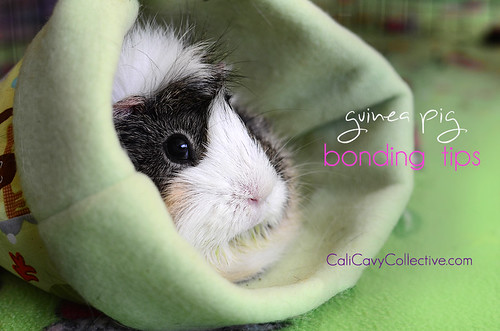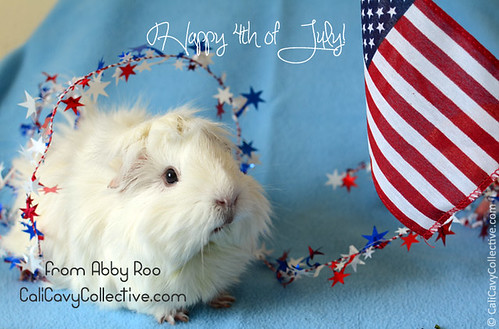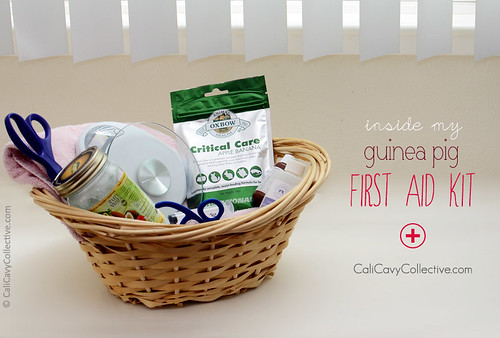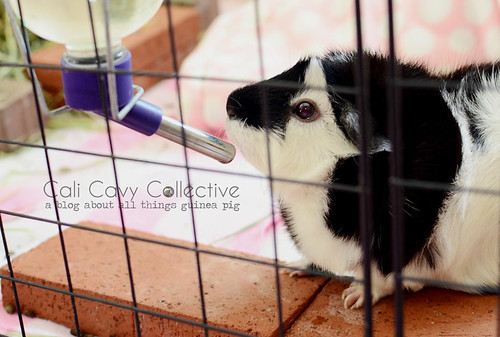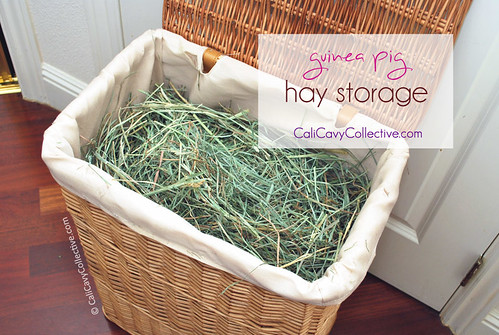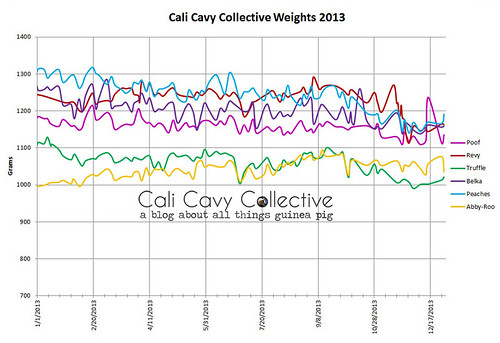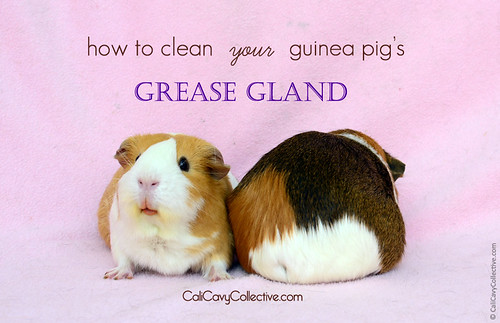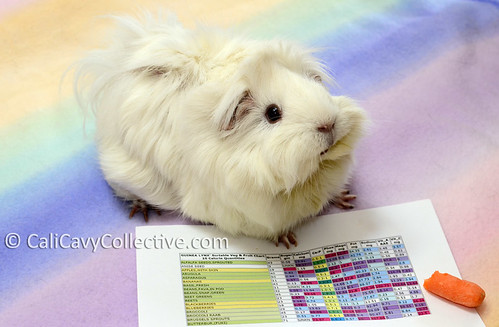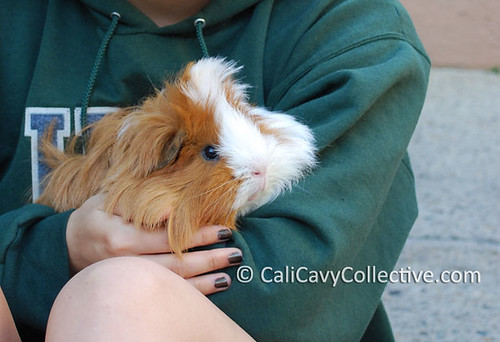Showing posts with label guinea pig care. Show all posts
Showing posts with label guinea pig care. Show all posts
11.21.2015
7 Tips for Bonding With Your Guinea Pig
Bringing home a guinea pig for the first time is always exciting. That fluff! Those floppy ears! And he makes such cute noises!
The excitement dies down a bit after the piggy parent observes that the newest addition to their family has spent most of the day in hiding. From there, the questions begin. "How do I bond with my guinea pig? How do I get her to trust me? It's been three weeks, why is he still scared of me?"
7.04.2014
Happy 4th! Fireworks Safety Tips For Your Guinea Pigs
Abby-Roo says Happy Independence Day! While you're out enjoying the festivities, don't forget about your piggies. Like many other pets they have sensitive hearing and can easily be spooked by fireworks, car alarms, or other loud noises.
6.07.2014
Inside My Guinea Pig First Aid Kit
When it comes to the pigs' health I tend to be cautious and overprepared. I even have my vet on speed dial listed right after the piggy dad. Along those lines, I've made sure to keep a well-stocked supply of medical essentials readily available in case of an emergency.
Here's a look at our guinea pig health kit, separated into first aid essentials and grooming supplies.
4.15.2014
Glass vs. Plastic Water Bottles For Your Guinea Pig
Plastic or glass? When it's time to choose a water bottle for your guinea pig, go for the glass! Yes, glass water bottles may cost a bit more but are worth the extra. Here's why.
4.01.2014
Guinea Pig Hay Storage
1.10.2014
2013 Guinea Pig Weight Charts
Routinely weighing your guinea pig is a recommended part of guinea pig care. Since sudden weight loss and a decreased appetite are among the first noticeable symptoms of illness, regular weighing is good practice. Kitchen scales are the perfect size for guinea pigs and provide more accurate readings than the larger scales meant to be used by humans. The entire chase-grab-weigh-record process is quick and doesn't take more than a few minutes.
9.04.2013
Cleaning Your Guinea Pig's Grease Gland
Quick grease gland checks are a regular part of our piggy grooming routine and a necessary part of cavy care. Out of our six pigs (all girls), Peaches tends to need the most attention here. Since she has a more active grease gland her piggy rump certainly benefits from the occasional extra wash!
Here's what you need to know about your wheeker's grease gland and how to keep it clean.
8.19.2013
Guinea Pig Nutrition Charts and Unsafe Foods List
7.16.2013
Guinea Pig Predator Safety Reminder
While we've been working away on the site, the piggies have been working away on the lawn. So much grass, so little time!
4.05.2013
Why grow wheatgrass for your guinea pigs?
So why go through the trouble of messing about with dirt and seeds? Here are some reasons why it is worth the effort:
1.28.2013
2012 Weight Charts
Routinely weighing your guinea pig is a recommended part of guinea pig care. Since sudden weight loss and a decreased appetite are among the first noticeable symptoms of illness, regular weighing is good practice. Kitchen scales are the perfect size for guinea pigs and provide more accurate readings than the larger scales meant to be used by humans. The entire chase-grab-weigh-record process is quick and doesn't take more than a few minutes.
These charts show each cavy's weight fluctuations over the past year and the overall trends beginning from when they were first adopted. Judging by the stabilization in their weights, Belka, Truffle, Peaches, Poof and Revy seem to have finished growing. This doesn't come as much of a surprise, considering that all five girls will be turning three this year.
11.04.2012
Abby-Roo's first hair trim
 |
| Before |
When Abby-Roo was adopted earlier this year her shark fin-like butt fur, while extraordinarily fluffy, was still rather short (to compare see her early photos here).
8.23.2012
5.01.2012
Guinea Pig Weight Charts
Routinely weighing your guinea pig is a recommended part of guinea pig care. Since sudden weight loss and a decreased appetite are among the first noticeable symptoms of illness, regular weighing is good practice. Kitchen scales are the perfect size for guinea pigs and provide more accurate readings than the larger scales meant to be used by humans. The whole chase-grab-weigh-record process is quick and doesn't take more than a few minutes. The most time consuming part is trying to nab everyone as they scramble for cover.
We have compiled a series of charts showing each pig's growth and changes in weight over time, starting from when they were adopted. Belka, Truffle and Peaches were adopted at the same time and were all about the same age, which explains the similarities in their charts. Both Poof and Revy were a bit older when they were adopted separately later, which accounts for the different trends in their respective charts.
3.12.2012
Hug your piggies daily!
1.13.2012
Tracking your guinea pigs weight
Regularly weighing your guinea pigs is good practice - not only does it give you an idea of what weight fluctuations are normal for your pig, but it also allows you to identify potentially worrisome trends, such as a gradual weight loss. As we have written before, sudden weight loss and decreased appetite are some of the first symptoms to show up when cavies fall ill so tracking your pigs weight is essential for their long term health (see earlier post here).
1.06.2012
Keep your cavies warm in winter
Just a friendly reminder to keep your guinea pigs warm and dry indoors during the chilly winter months! Guinea pigs are particularly susceptible to upper respiratory infections (URIs), which can result from exposure to cold damp environments - such as soiled bedding or being kept outdoors/in the garage.
1.04.2012
A Guinea Pig's Normal Body Temperature
Fellow cavies, does your human like to spend extra time cuddling you on chilly days? Well, this is because us guinea pigs operate at a higher normal body temperature than humans do!
11.26.2011
It's Normal for Guinea Pigs to Eat Their Own Poop
Have you ever seen your guinea pig dip his head down between his hind legs, then come up for air chewing on something? If so, then you've witnessed your piggy eating his own poops. This is known as coprophagy, or coprophagia. Don't stop your piggy if you see him or her doing this! Although humans might find this odd or distasteful, coprophagy is an essential part of the digestive process and is considered perfectly normal behavior for a guinea pig.*
Subscribe to:
Posts (Atom)

